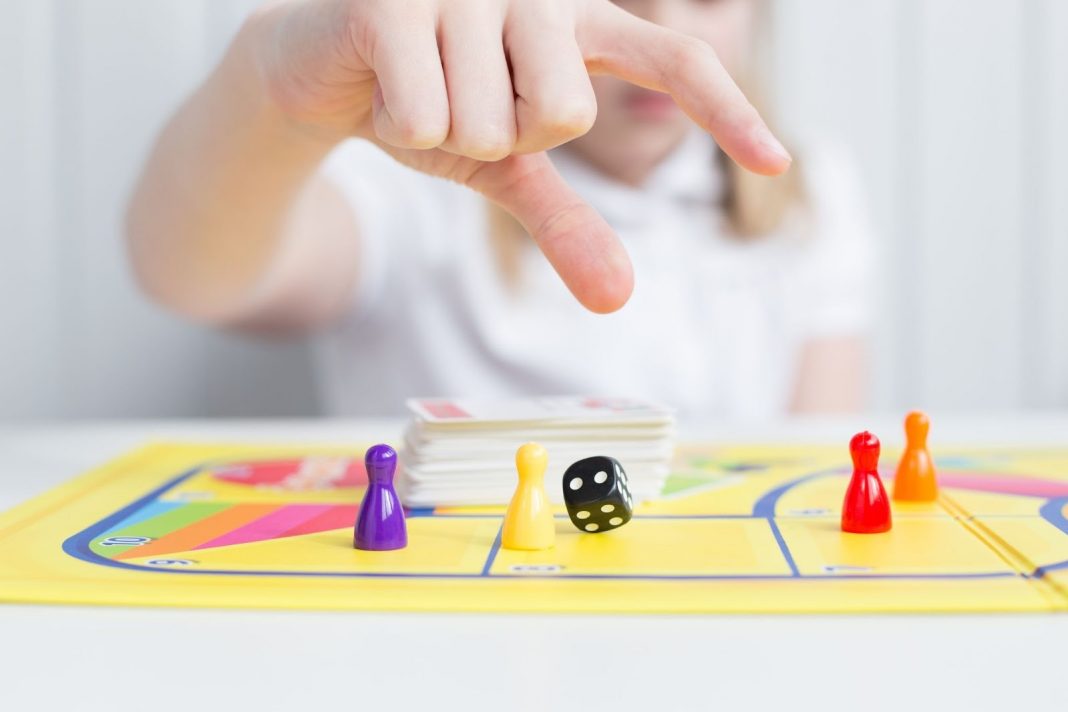Games play a pivotal role in the growth and development of children. They are not just entertainment tools but crucial for learning and honing various skills. From improving cognitive abilities to enhancing social interactions, games offer many benefits that aid in the holistic development of young minds. Dice games for kids hold a special place among the many types of games. They are simple yet incredibly versatile, making them suitable for children of various ages. Dice games often involve elements of chance, strategy, and skill, offering a unique blend of excitement and learning opportunities.
Math & ELA | PreK To Grade 5
Kids see fun.
You see real learning outcomes.
Watch your kids fall in love with math & reading through our scientifically designed curriculum.
Parents, try for free Teachers, use for free
This blog will explore some of the best dice games for kids. These games are fun and educational, helping children develop mathematical skills, strategic thinking, and social interaction abilities.
1. Sum Swamp
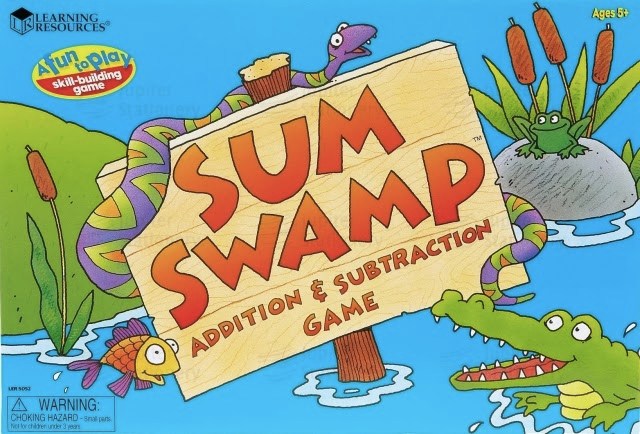
Sum Swamp is a fun educational dice game that guides children through a swamp adventure filled with math challenges.
How to Play: Players roll two number dice and a math symbol die (plus or minus) to navigate their character through the swamp by solving basic addition or subtraction problems.
Learning Outcome: As one of the essential math games with dice, it teaches basic arithmetic operations, specifically addition and subtraction, and improves number recognition skills.
Age Suitability: 5 years and up
Number of Players: 2-4
Price: 13.89$
Buy Here : Amazon
2. Math Dice
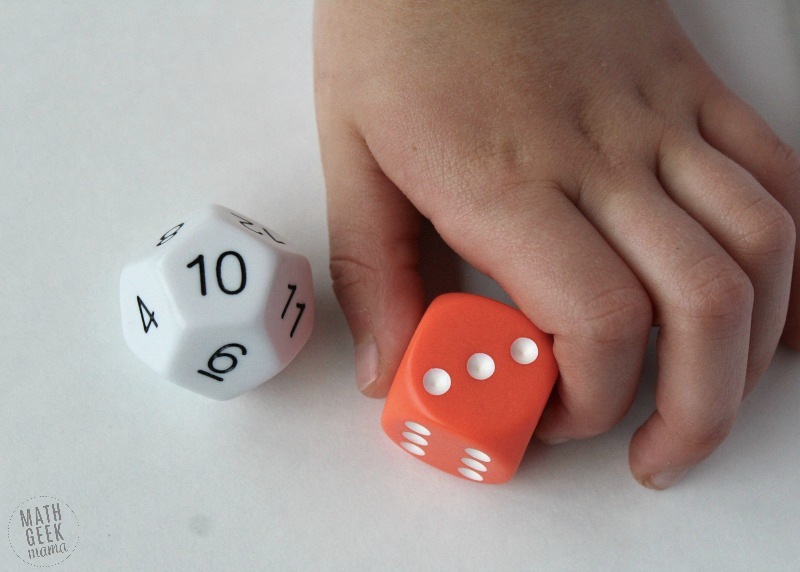
Math Dice stands out among educational dice games, offering a brain-teasing challenge that enhances mental arithmetic skills.
How to Play: Players roll two 12-sided dice to set a target number and three regular dice to get three numbers. They use arithmetic operations to reach or get as close to the target number as possible.
Learning Outcome: This game boosts mental math abilities, encourages problem-solving, and helps understand the use of different arithmetic operations.
Age Suitability: 8 years and up
Number of Players: 2 or more
Price: 12.95$
Buy Here: Amazon
Related Reading: Fun Problem-Solving Activities for Growth Mindset
3. Tenzi
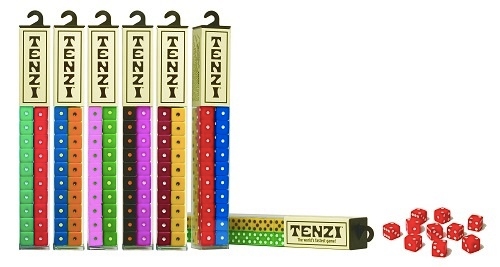
Tenzi is one of the most exciting dice rolling games, perfect for developing quick thinking and number recognition in a fast-paced environment.
How to Play: Each player starts with 10 dice. The goal is to roll the dice as fast as possible to get all of them to show the same number. The first to succeed wins.
Learning Outcome: Tenzi is one of the most fun games to play with dice that helps in improving quick reflexes, enhances number recognition, and develops the ability to make rapid calculations.
Age Suitability: 7 years and up
Number of Players: 2-4
Price: 28.90$
Buy Here: Amazon
Related Reading: Best Number Activities for Preschoolers
4. Sequence Numbers
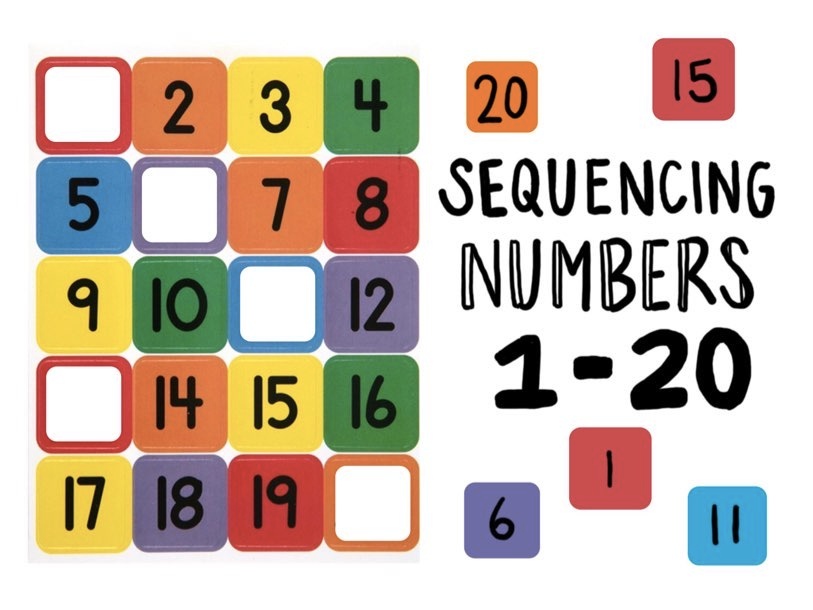
Sequence Numbers is a unique blend of board and math games with dice, offering a fun way to practice math equations.
How to Play: Players roll a dice and place a chip on the corresponding number equation on the board. The aim is to align five chips in a row.
Learning Outcome: This game encourages strategic thinking and enhances understanding of basic math equations and number sequences.
Age Suitability: 7 years and up
Number of Players: 2-6
Price: 8.99$
Buy Here: Amazon
5. Dice War: Addition and Subtraction
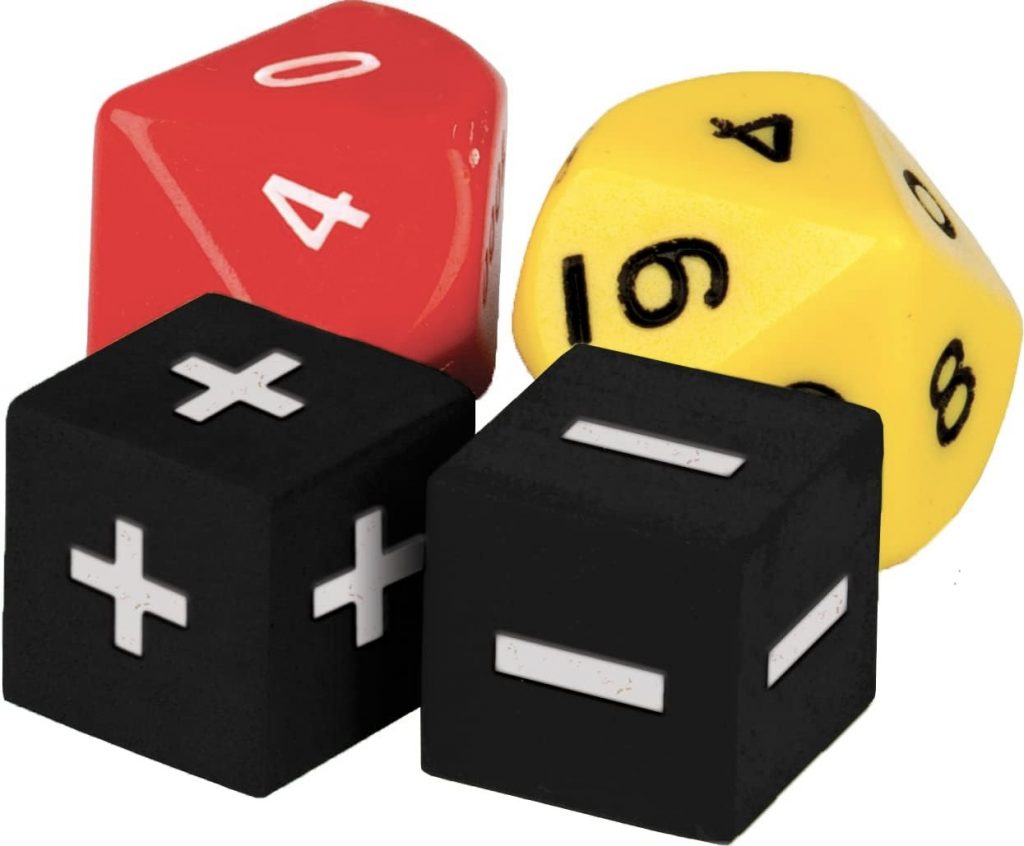
Dice War is a simple dice game that turns basic arithmetic into a fun competition, ideal as an easy dice game for kids.
How to Play: Each player rolls two dice and adds or subtracts the numbers. The player with the higher sum or difference wins the round
Learning Outcome: This game enhances basic addition and subtraction skills, promoting quick mental arithmetic and number comparison
Age Suitability: 6 years and up
Number of Players: 2
6. Fraction Formula
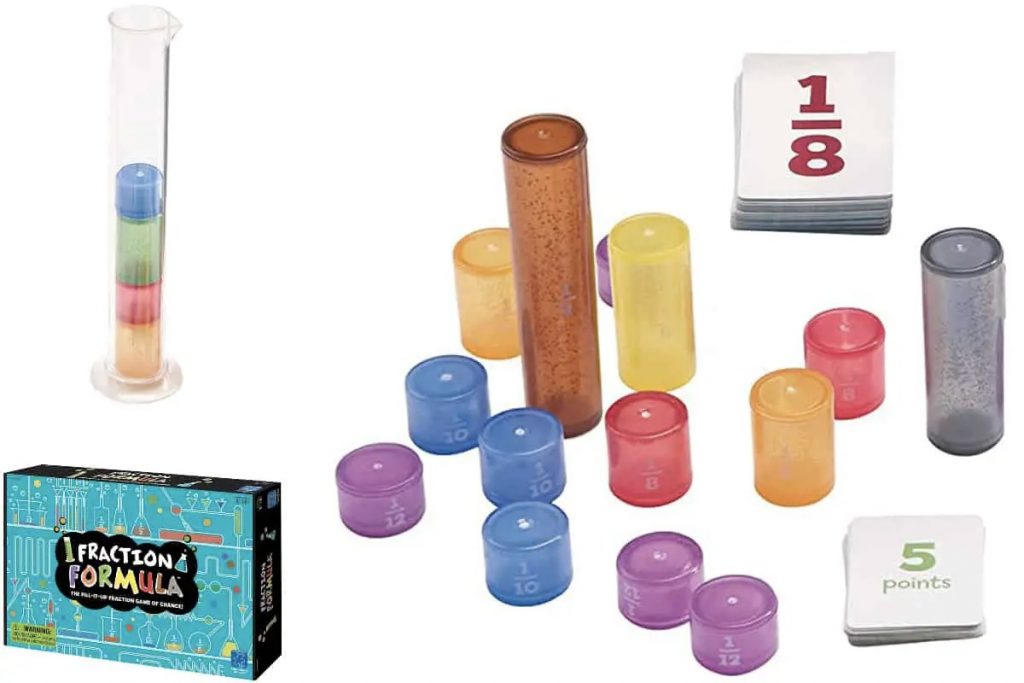
Fraction Formula is an innovative math game with dice that introduces children to fractions in an interactive and engaging way.
How to Play: Players roll dice to determine which fraction of a cup to fill with colorful pieces. The goal is to get as close as possible to a full cup without overflowing.
Learning Outcome: It teaches fraction recognition and estimation, helping kids understand part-to-whole relationships and basic fraction addition.
Age Suitability: 8 years and up
Number of Players: 2-4
Price: 18$
Buy Here: Amazon
Related Reading: How to Make Adding and Subtracting Fractions Easy
7. Roll For It!
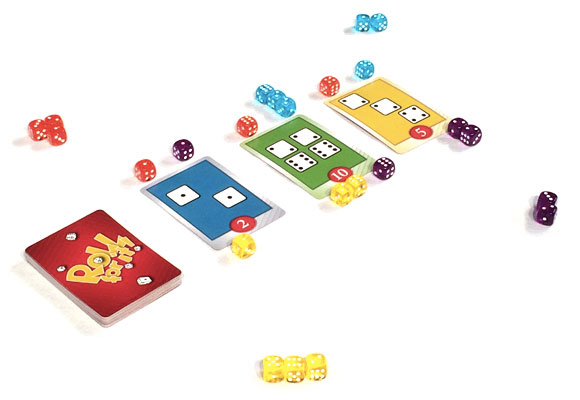
Roll For It! is a fun dice game that combines luck and strategy, challenging players to match dice rolls to specific card combinations.
How to Play: Players roll their dice and attempt to match the numbers to the combinations shown on the cards. The first to match all their dice to a card wins it.
Learning Outcome: This game encourages number matching and introduces basic probability concepts, enhancing strategic thinking.
Age Suitability: 8 years and up
Number of Players: 2-4
Price: 19.99$
Buy Here: Amazon
8. City of Zombies
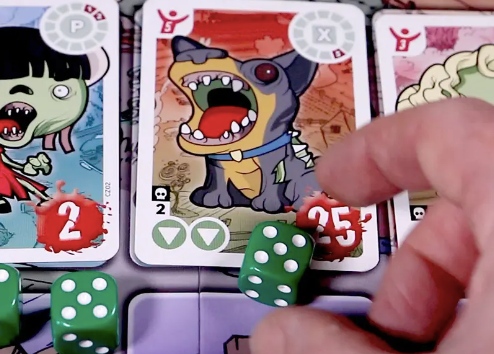
City of Zombies is a thrilling cooperative math dice game where players use math skills to survive zombie attacks, perfect as an icebreaker dice game.
How to Play: Players work together, using their dice rolls to perform addition, subtraction, multiplication, or division to defeat waves of zombies.
Learning Outcome: This game strengthens a range of math skills, including all four basic arithmetic operations, and encourages teamwork and problem-solving.
Age Suitability: 10 years and up
Number of Players: 1-6
Price: 19.89$
Buy Here: Amazon
Related Reading: Best Indoor and Outdoor Team Building Activities for Kids
9. Rat-a-Tat Cat
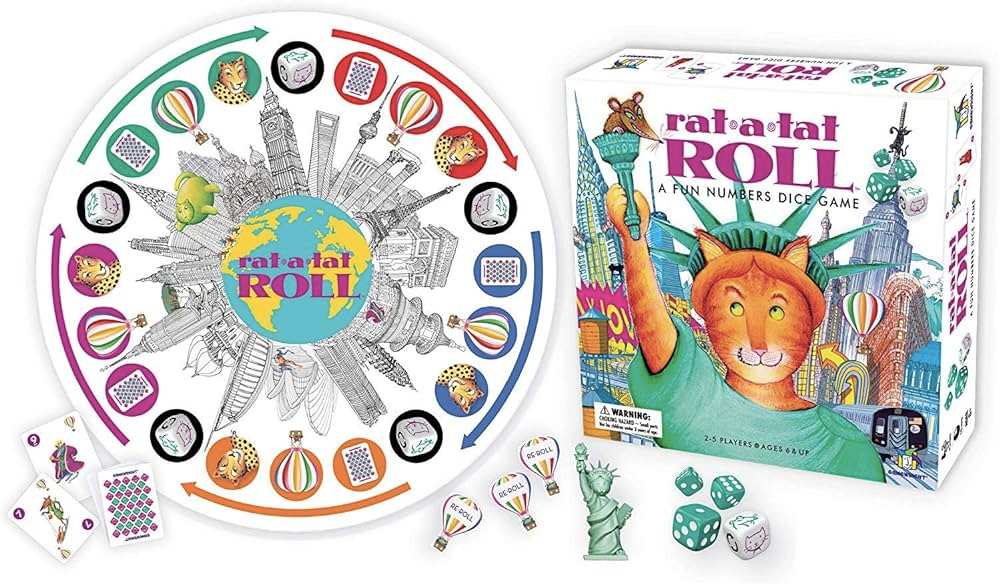
Rat-a-Tat Cat is a clever blend of math and strategy, making it one of the most engaging addition dice games for kids.
How to Play: Players draw cards with values and aim to have the lowest score. Dice are rolled to allow swapping cards, adding an element of chance and strategy.
Learning Outcome: This game enhances addition and subtraction skills and encourages strategic thinking and memory development.
Age Suitability: 6 years and up
Number of Players: 2-6
Price: 17.28$
Buy Here: Amazon
Related Reading: Best Memory Games for Kids to Enhance Cognitive Skills
10. Math Bingo
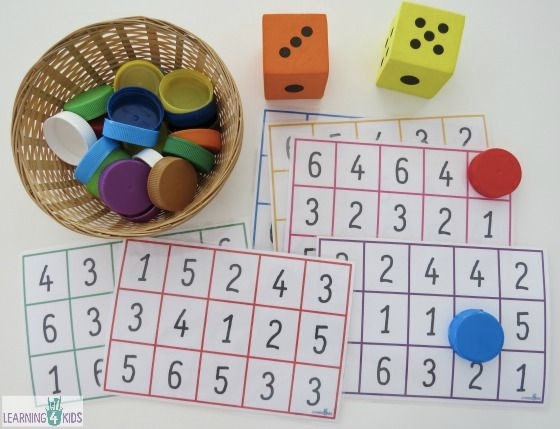
Math Bingo puts a mathematical twist on the classic game, making it a perfect choice for dice games for groups.
How to Play: Players roll dice and perform math operations (like addition or multiplication) with the rolled numbers. They then mark the answer on their bingo cards.
Learning Outcome: It reinforces arithmetic skills and number recognition, promoting quick thinking and concentration.
Age Suitability: 7 years and up
Number of Players: 2 or more
Price: 25.99$
Buy Here: Amazon
Related Reading: Best Concentration Games for Kids to Improve their Focus
11. Pizza Fraction Fun Game
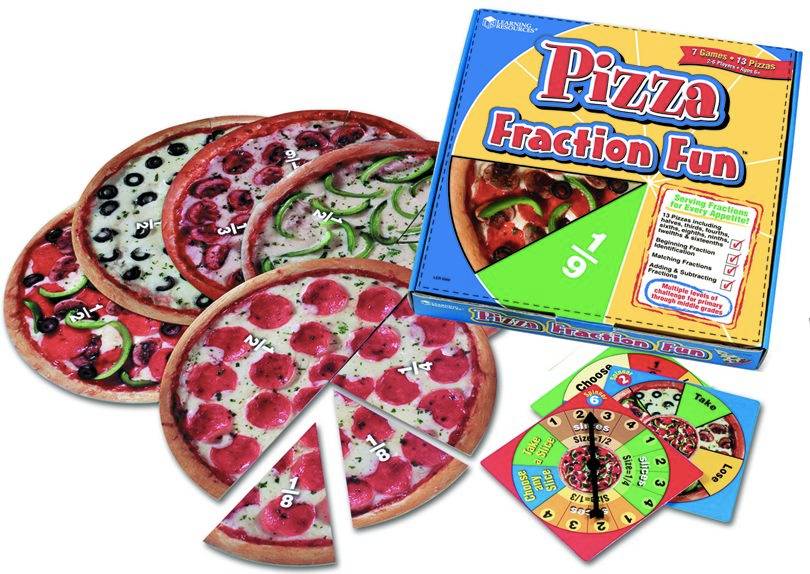
The Pizza Fraction Fun Game is an appetizing way to learn fractions, standing out among math dice games.
How to Play: Players roll dice to collect different pizza slices represented by various fractions. The goal is to complete a pizza with the correct fraction pieces.
Learning Outcome: This game teaches fraction recognition, equivalence, and addition, making fractions relatable and fun.
Age Suitability: 6 years and up
Number of Players: 2-6
Price: 27.94$
Buy Here: Amazon
Related Reading: How to Multiply & Divide Fractions: 4 Easy Steps
12. Money Bags Coin Value Game
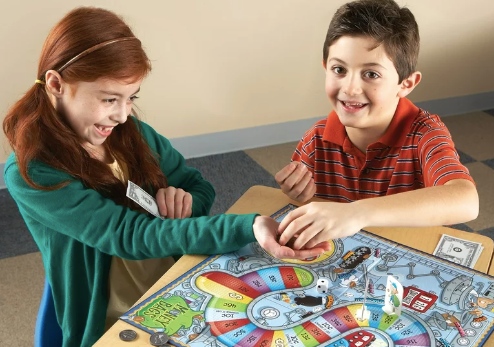
Money Bags Coin Value Game is an educational game that teaches coin recognition and counting.
How to Play: Players roll dice to earn coins of different values and then count their total earnings, exchanging coins for higher values.
Learning Outcome: It helps understand money value, and basic addition, and encourages practical math skills.
Age Suitability: 7 years and up.
Number of Players: 2-4
Price: 13.99$
Buy Here: Amazon
Related Reading: Best Counting Activities for Preschoolers
4 Benefits of Dice Games for Kids
- Enhances Mathematical Skills: Dice games are excellent tools for improving mathematical abilities in children. They naturally incorporate counting, addition, and even more complex concepts like probability. Rolling dice and calculating scores help children practice these skills in a fun, low-pressure environment, leading to better number fluency and arithmetic skills.
- Promotes Social Skills: Playing dice games often involves multiple participants, encouraging children to develop essential social skills. These games teach turn-taking, cooperation, and how to engage in healthy competition. Children learn to follow rules, wait for their turn, and interact with others in a respectful and collaborative manner.
- Improves Critical Thinking and Decision Making: Many dice games require players to think strategically and make decisions based on the current situation. Whether it’s deciding which numbers to aim for in multiplication games with dice or figuring out the best move to win, these games challenge children to use logic and critical thinking, enhancing their decision-making skills.
- Develop Fine Motor Skills: The physical aspect of rolling dice and moving game pieces is beneficial for developing fine motor skills in younger children. These actions require control and coordination, helping to improve hand-eye coordination and dexterity.
Related Reading: Best & Most Entertaining Games to Play When Bored
Conclusion
Dice games offer a unique blend of fun and learning, providing children an enjoyable way to develop mathematical skills, social abilities, and critical thinking. By incorporating these games into playtime, we can foster a love for learning and encourage holistic development in a playful and engaging manner.
Related Reading: Best Brain Games for Kids for Their Holistic Development
Frequently Asked Questions (FAQs)
What is the ideal age to introduce dice games to children?
Dice games can be introduced as early as age 3 or 4, starting with simple counting games. As children age 6 to 8 years old, they can engage in more complex games involving strategy and advanced math concepts.
Can dice games help children who struggle with math?
Absolutely! Dice games make math tangible and fun, which can be particularly beneficial for children who find traditional math challenging. They provide a hands-on, interactive way to understand numbers and operations, making math more approachable and less intimidating.
Are dice games suitable for group activities in classrooms or parties?
Yes, dice games are excellent for groups and can be a hit in classrooms or parties. They encourage teamwork and social interaction and can be a great icebreaker activity, making them ideal for educational and social settings.
How can dice games enhance specific math skills like probability and multiplication?
Dice games are versatile tools for teaching various math concepts. Probability games with dice help children understand chance and outcome predictions. In contrast, multiplication games with dice reinforce times tables and quick mental calculations, making these concepts more engaging and easier to grasp.

















